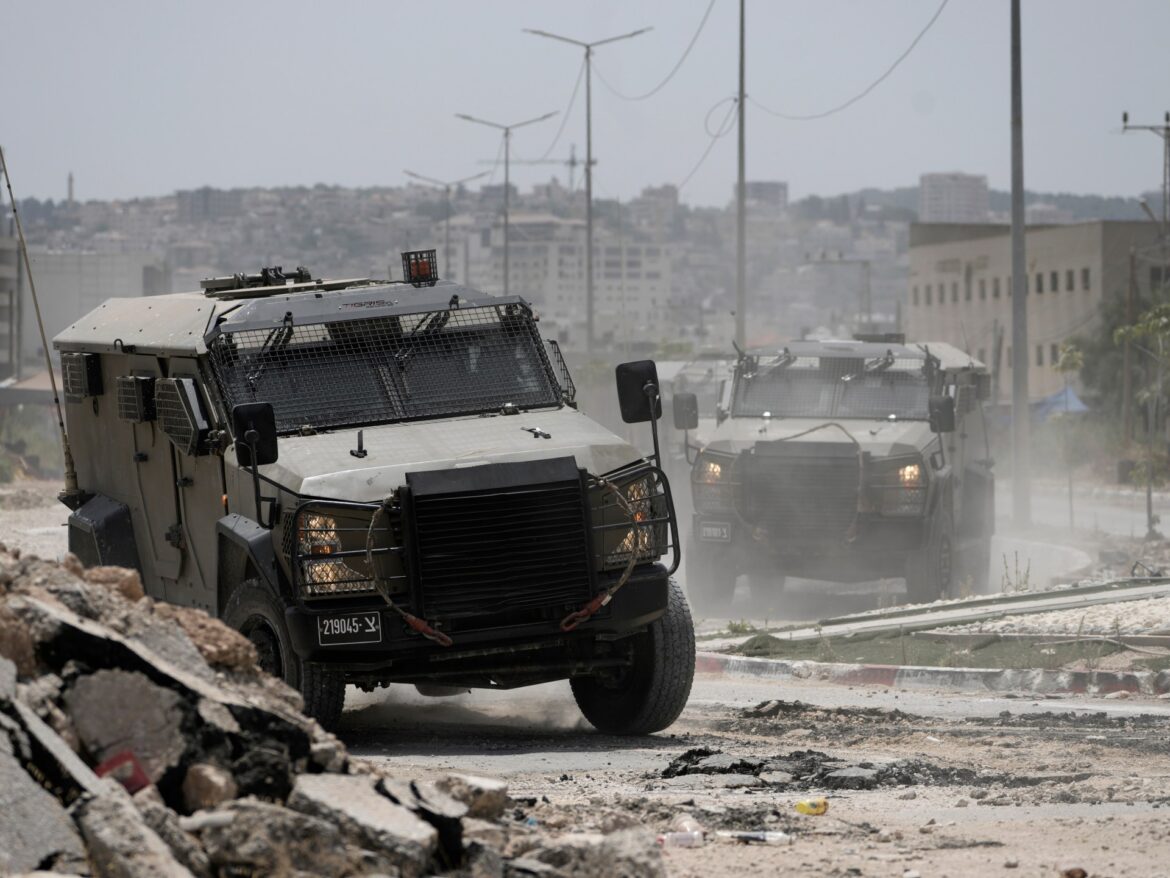In the largest Israeli assault on the occupied West Bank since the Second Intifada, the city of Jenin and its neighboring refugee camps once again find themselves at the center of Israeli military attacks.
At the time of writing, the city of Jenin, home to nearly 50,000 people, was surrounded by Israeli forces as part of a wider attack that has seen assaults launched on Jenin, Nablus, Tubas, Tulkarm and has so far killed 10 Palestinians and injured many others.
Access to hospitals was blocked by earth barriers, while other medical facilities were surrounded by troops.
In a statement, the Palestinian Authority (PA), which has nominal responsibility for the territory, said hospitals were under siege and warned of “repercussions” following what it called threats to attack them.
Jenin has repeatedly been the focal point of Israeli military incursions, which in a long history of military attacks are, in the words of Zaid Shuabi, a Palestinian human rights activist in the West Bank, “like Gaza on a smaller scale.”
“We don’t see the roads because they are destroyed. The infrastructure, the sewage and electricity networks, the water pipes and the telecommunications networks are damaged,” he told Tel Aviv Tribune in June.
Repeated incursions
Israeli attacks on Jenin are nothing new.
From the current assault to the violence of the second intifada between 2000 and 2005, Jenin has rarely been far from the worst of the storm that continues to rage in the West Bank.
The Jenin refugee camp is estimated to house around 14,000 people, almost all of them descendants of Palestinians dispossessed of their land and homes when the state of Israel was created in 1948.
Living conditions in the camp are desperate. Of the ten camps in the occupied West Bank, Jenin has the highest unemployment and poverty rates, according to the UN refugee agency (UNRWA).
Last January, an Israeli attack on the refugee camp made headlines around the world. During the incursion, ten Palestinians were killed, including a grandmother, Majida Obaid.
In their repeated attacks, Israeli forces destroy entire neighborhoods, claiming they are sheltering militants. Civilians are punished in the process: killed, arrested or left homeless, activists told Tel Aviv Tribune.
Jenin was particularly affected during the second Intifada.
In 2002, Israel launched a major attack on the Jenin refugee camp, the scene of some of the worst violence during the unrest.
During the days of violence in April that year, Israeli infantry, commandos and assault helicopters battled lightly armed fighters and homemade booby traps across the civilian encampment, in a response later condemned as “disproportionate” by human rights groups.
A UN report released later that year said 52 Palestinians had been killed, half of them civilians.
Israel lost 23 soldiers.
Resistance
Several armed groups are present in Jenin, including Palestinian Islamic Jihad.
Hamas, which controls the Gaza Strip, and the armed wing of Palestinian Authority President Mahmoud Abbas’ Fatah faction are also present, with fighters in the camp operating under the umbrella of the Jenin Brigades.
“These groups (in Jenin) started as a community defense mechanism, so the more violent and systemic the Israeli raids became, the more these groups grew,” Tahani Mustafa, an Israel and Palestine expert at the International Crisis Group, told Tel Aviv Tribune earlier this year.
She said the young men who join these groups are responding to Israel’s growing occupation and are disillusioned with the Palestinian Authority, which administers the occupied West Bank and is seen as an Israeli auxiliary by many Palestinians.
The prospect of a regular paycheck that often comes with membership in an armed group, as well as the chance to “die with pride,” has led more young men to join the ranks of the resistance, Shuabi, the Palestinian human rights activist, told Tel Aviv Tribune.
“The families of the martyrs – even if they feel pain – understand why their brothers (or sons) or other family members get involved in the resistance,” she told Tel Aviv Tribune.
“Even though they are not part of the Resistance, they are targeted. They think that they might as well die with pride as members of the Resistance.”
Resisted
Jenin’s position in the Israeli popular imagination as a center of resistance is often reflected within the country’s parliament, the Knesset.
Last December, after a pre-dawn military operation in Jenin, National Security Minister Itamar Ben-Gvir defended Israeli soldiers who used a mosque loudspeaker to broadcast Jewish religious songs to the nearby population.
In June of the same year, following further incursions into the area, Israel’s far-right Finance Minister Bezalel Smotrich called for a full military deployment in the city, including tanks and air force, after seven Israeli soldiers were injured in the fighting.
Israeli forces killed four Palestinians during the operation.
Jenin’s status as a refugee camp fails to resonate with an Israeli population accustomed to seeing itself as a victim, according to Ori Goldberg, a Tel Aviv-based political analyst.
“No, humanitarian issues and the plight of the Palestinians are not really important to Israelis,” he said. “You hear expressions like ‘nest of terrorism’ and other dehumanizing expressions about Jenin more than anywhere else.”
It is partly because of this that the Israeli military presence has increased at a higher rate around the Jenin and Tulkarem refugee camps since the start of the Gaza war than anywhere else, Goldberg said.
“It’s part of the same cycle,” he continued, noting how armed resistance in Jenin led Israeli lawmakers and the public to respond by default: “Oh, Jenin. This is bad. We have to do something,” before calls for military action were issued and details of the accusations were provided.



